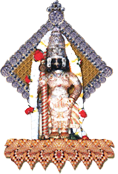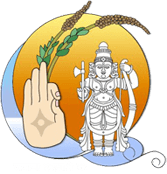|| Om Namo Bhagavatē Vāsudēvāya | Shri Gurubhyō Namah ||
– Abhijith R. Shastry
Shastry.abhi@live.com
It is evident from Vaishnava Samprādaya that Maha Vishnu or Srimań Nārāyana is the supreme being who lives in the consciousness of every being and drives the knowledge behind every creation in this colossal multiverse. He is at the epicentre in a divine sleep, and his consort Lakshmi (Sri Devi) at his feet, hence forming the Purusha & Prakŕti duality. He is then adorned by his 8 wives (Ashta Mahishi’s) imagined as the 8 inner petals of the Mahāpadma. The bed of the flower being created from the body of Shesha and all his divine family members at sides waiting for his command – Mukhyaprāna, Brahma, Rudra, Garuda and all other devatha’s. Just imagining this make us realize that he is the ‘Sarvāntaryāmi‘.
He, being the driving force within all the Devatha’s, with each one driven by a different roopa of himself according to the appropriate ‘Tatva’, to perform assigned ‘Karma’. I have tried to create a modest listing of such Devatha’s along with the roopa of Vishnu within each of them. My sincere thanks to Chi. Anirudha Bhat, Kadandale, and few other renowned scholars for helping me with all relevant details and research.
*Note: Some of the deities orchestrate more than one Tatva, and hence, the Antaryāmi of that deity would be multiple. As these details are scattered across in Sookta’s and Samhita’s it would be difficult to collate for each deity in this article. Hence, the below listing is focussed at the most popular names of the Antaryāmi roopa that drives the deity.
| Sl. | Devatha |
Antaryāmi Rūpa of Vishnu
|
| 1 | Lakshmi (or) Sri Devi (or) Mūla Prakŕti |
Srimań Nārāyana
(or) Purusha |
| 2 | Chaturmukha Braĥma | Maha Vishnu (or) Purusha (or) Braĥman |
| 3 | Mukhya Prāna (or) Vāyu Hanuma Bheema Madhwa |
Lakshmī Nŕsimha
Sitā Rāma Kŕshna Vēda Vyāsa |
| 4 | Rudra (or) Shiva |
Lakshmī Nŕsimha
|
| 5 | Shēsha |
Sańkarshana
|
| 6 | Vāsuki | |
| 7 | All Other Nāgās: Ananťa, Mānasa, Padma, Kambaĺa, Kārkōtaka, Ashvitara, Dhritarāshtra, Śankapāla, Kālīya, Taķshaka, Pingaĺa and others |
|
| 8 | Garuda | Nārāyana |
| 9 | Dēvēndra | Paramātma |
| 10 | Durgā |
Lakshmī Nŕsimha
|
| 11 | Pārvathi |
Rudrāntargata Lakshmī Nŕsimha
|
| 12 | Bhārathi |
Mukhyaprānantargata Lakshmī Nārāyana
|
| 13 | Ashta Mahishi’s | Kŕshna |
| 14 | All Other Female Devatās |
Lakshmī Nārāyana
|
| 15 | Agni | Parashurāma |
| 16 | Varuna | Vāsudeva |
| 17 | Nārada | Nārāyana |
| 18 | Bŕhaspati | Vāmana |
| 19 | Ganapathi | Vishwambhara |
| 20 | Skanda | Praďyumna |
| 21 | Yama | Janārdhana |
| 22 | Kāma | Praďyumna |
| 23 | Bhŕgu (Agni Taťva) | Parashurāma |
| 24 | Sapta Rishi’s (Atri, Angirasa, Kāshyapa, Vishwāmitra, Bhārgava, Bhāradwaja, Gautama) |
Veda Vyāsa |
| 25 | Kubēra |
Lakshmī Nārāyana
|
| 26 | Daksha | Nārāyana |
| 27 | Ashwinī Dēvatha’s (Darsha & Nasatya) |
Dhanvantari |
| 28 | Kāmadhenu | Vāsudēva |
| 29 | Nandi, Veerabhadra, Dandapāni Other Shivagana’s / Bhūtagana’s |
Rudrāntargata Lakshmī Nŕsimha
|
| 30 | Mithra |
Sūrya Nārāyana / Savithŕ
|
| 31 | Pithŕ Dēvatha’s |
Vasurudrādityāntargata Janārdhana
|
| 32 | Vāsthu | Bhūvarāha |
| 33 | Navagŕhas: Sūrya Chandra Mangala Budha Guru Shukra Shani Rāhu Kētu |
Rāma
Kŕshna Nŕsimha Budďha / Hayagrīva Vāmana Parashurāma Koorma Varāha Maťsya |
| 34 | Vishwaķsena | Mahā Vishnu |
| 35 | Swayambhuva Manu | Yajna Nārāyana |
| 36 | Vaivaswatha Manu | Maťsya |
| 37 | Uttama Manu | Satyasēna |
| 38 | Sāvarńi | Sārvabhauma |
| 39 | Rēvanta / Raivatha |
Vaikunţa
(This is also one of Vishnu’s roopa’s) |
| 40 | Rudra Sāvarńi | Sudhāma |
| 41 | Dēva Sāvarńi | Yōgēśhwara |
| 42 | Indra Sāvarńi | Brihaďbhānu |
| 43 | Ganga | Mādhava |
| 44 | Praĥlāda |
Lakshmī Nŕsimha
|
| 45 | Bali | Vāmana |
| 46 | Vishwakarma | Kŕshna* |
| 47 | Yaksha Gańa |
Rudrāntargata Lakshmī Nŕsimha
|
| 48 | Gandharva Gańa | Praďyumna |
| 49 | Dasha Dikpāla (or Lōkapāla) Kubera (North, Uttara) Yama (South, Dakshina) Indra (East, Pūrva) Varuna (West, Paschima) Ishana (Northeast, īshānya) Agni (Southeast, āgnēya) Vāyu (Northwest, Vāyavya) Niŕtţa / Niŕtţi (Southwest, Naiŕtya) Ananta (Nadir, Adhah:) Brahma (Zenith, Ūrdhva:) |
Paramātma
(few exceptions – Niŕtţa/ Niŕtţi – Sańkarshana Ananta – Sańkarshana Brahma – Sańkarshana) |
| 50 | Dhruva | Vasudeva |
| 51 | Agasťya | Parashurāma |
| 52 | Nakshatra Gańa | Paramātma |



Wonderful work abhi
Detailed information of Mahavishnu…
Very nice Abhi..
Keep sharing… 👍🏻
Thank you very much for your hardwork to collate all of this under a single umbrella, Abhijith 🙂
Excellent: very very useful information